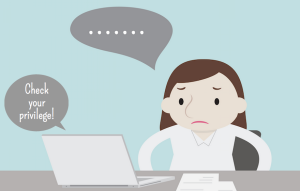
Credit: Getty Images
If certain men’s rights activists and other anti-feminists are to be believed, women have a power over men that feminists are afraid to talk about.
For example, some claim that women can casually drop rape accusations and be automatically believed, thereby destroying the lives and reputations of innocent men.
The thing is, feminists are well-aware of the fact that there are morally inept women out there who make false allegations of rape. Yes. It happens.
It’s not a secret that we’re keeping from anyone.
But given that we live in a world where 54% of rapes are not reported to police and 97% of accused rapists never go to jail, the fact that some women lie about rape isn’t exactly the most pressing conversation we need to be having.
Yes, lying about rape can have the potential to devastate the life of the person accused. The fact that women lie about rape is neither irrelevant nor unimportant to feminists.
After all, there is the racial history of black men being killed after accusations of rape from white women, as well as gaps in our justice system that lead to the imprisonment of innocent men.
However, overemphasizing the fact that some women accuse men of rape hurts the credibility of the greater number of women that report rape because it happened to them.
So, here’s why feminists tend to keep the focus on women getting justice in cases of rape rather than instances of “crying” rape.
1. Some Women Lie About Rape But It’s Rare
I think part of the reason critics of feminism argue that many women lie about rape is because of another myth: Feminists don’t want anyone to think that women ever lie about rape.
But that’s not true.
It would be more accurate to say that the number of women who report rape when it happens so greatly outnumber false accusers that it would be unjust and heinous to act on the assumption that women lie about rape all the time.
The fact is: Rape is already a grossly underreported crime. Rape trials already involve a great deal of investigation and intrusive questioning of alleged victims, An estimated 2-8% of rape accusations are considered unfounded.
Lying about rape is not nearly as prevalent a problem as rape.
2. Victim-Blaming Exists and Is Rampant in Criminal Prosecutions
Accusing someone else of rape is not a guarantee of therapists and tea for women.
The very idea that women subject themselves, en masse, to the social, legal, and medical ramifications of reporting rapes that never happened is ridiculous considering how often our culture questions the victim’s credibility first.
What was she wearing? Why was she out late at night? What did she have to drink? Does she sleep around? Why didn’t she scream? Did she have sex with him before? Did she fight?
How often does anyone ask about the accused rapist’s sexual habits, clothing, or drugs of choice?
Furthermore, the belief that false rape accusations are commonplace fuels victim blaming.
Though people are rightfully outraged by cases of rape and lend their support to victims, we still live in a society where the credibility of rape victims is regularly invalidated.
We live in a world where victims of rape who do come forward may have their privacy and space to heal invaded by intrusive rape kits, probing questions from law enforcement and family, and testimony that forces them to relive their trauma in a public way.
Not to mention asinine things like the tightness of a woman’s jeans at the alleged time of rape are brought up in attempts to discredit rape accusations.
3. Rape Myths Hurt the Accuser’s Credibility
The alleged victims of rape often go through a greater degree of scrutiny than alleged rapists, as in cases where the videos and names and identities of victims go viral on the Internet, or when the defense discredits victims by claiming that they didn’t fight enough or scream enough to have been raped.
As such, a woman who accuses someone of rape, whether through the criminal justice system or within a family or social circle, faces incredible risk herself.
If she’s not believed, she could face the risk of losing close relationships with people who continue to support and socialize with the accused rapist.
If she goes to the police and her case goes to trial, she will have to repeat the details of the alleged rape, and possibly her own sexual history, to a variety of people who aren’t necessarily understanding of consent.
For instance, a woman who accused five perpetrators of gang rape had her case dismissed because she’d made online statements about having group sex fantasies.
The dismissal of her case flies in the face of everything feminists understand about consent and victim blaming.
But from the perspective of the court, she lost her credibility because she was a woman with a “deviant” sexual fantasy life.
This brings me to another point: If people have different understandings of consent, desire, and what rape really is, we run the risk of calling credible accusations of rape lies for attention.
If a woman says yes to sex and later says no, but the person she’s having sex with continues, this is rape. But not every court, media outlet, or rapist believes that this constitutes rape.
So while those with an understanding of consent will see a need to investigate, others will dismiss the woman as lying, attention seeking, or over-reactionary, even though the incident she described constitutes rape.
The same can be said in cases of statutory rape, rape that involved the use of drugs or alcohol, rape by a spouse or intimate partner, and the list could go on.
In all of these situations, there are still people who confuse a lack of aggression with consent.
—
Feminists don’t want people to assume that all women who report rape are telling the truth.
We want people to remember that women who report rape are human beings, who are more than likely reliving a traumatic event in their lives while going through the entirely new trauma of dealing with the criminal justice system.
Conversely, we also don’t want men to be considered guilty-until-proven-innocent when accused of rape.
However, the side of caution we should err on is that of giving people the benefit of the doubt when they do something as exposing and risky as reporting rape.
[do_widget id=”text-101″]
Jarune Uwujaren is a Contributing Writer for Everyday Feminism. A Nigerian-American recent graduate who’s stumbling towards a career in writing, Jarune can currently be found drifting around the DC metro area with a phone or a laptop nearby. When not writing for fun or profit, Jarune enjoys food, fresh air, good books, drawing, poetry, and sci-fi. Read their articles here.
Search our 3000+ articles!
Read our articles about:
Our online racial justice training
Used by hundreds of universities, non-profits, and businesses.
Click to learn more




















